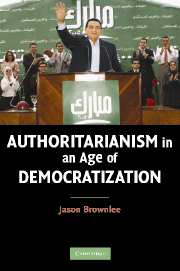Book contents
- Frontmatter
- Contents
- List of Figures and Tables
- Abbreviations and Acronyms
- Acknowledgments
- Introduction: Authoritarianism in an Age of Democratization
- 1 The Political Origins of Durable Authoritarianism
- 2 The Inception of Ruling Parties
- 3 Institutional Legacies and Coalitional Tensions
- 4 Ruling Parties and Regime Persistence
- 5 Elite Defections and Electoral Defeat
- 6 Confrontation and Democratization
- 7 Conclusions
- References
- Index
1 - The Political Origins of Durable Authoritarianism
Published online by Cambridge University Press: 05 June 2012
- Frontmatter
- Contents
- List of Figures and Tables
- Abbreviations and Acronyms
- Acknowledgments
- Introduction: Authoritarianism in an Age of Democratization
- 1 The Political Origins of Durable Authoritarianism
- 2 The Inception of Ruling Parties
- 3 Institutional Legacies and Coalitional Tensions
- 4 Ruling Parties and Regime Persistence
- 5 Elite Defections and Electoral Defeat
- 6 Confrontation and Democratization
- 7 Conclusions
- References
- Index
Summary
The end of authoritarianism has long been forecast but has yet to come (Pye 1990). In the 1990s, it was hoped that the wave of democratic change would continue unabated. Autocrats, it appeared, were trapped between political bankruptcy, on one side, and precarious liberalization, on the other. Those who excluded the public from national politics had no legitimating ideology and could only defend themselves as provisional stewards of the nation (O'Donnell and Schmitter 1986: 15). If they sought to prolong their rule indefinitely, they had to resort to elections and other democratic procedures, thereby adopting the mantle of republicanism even as they eschewed its fundamentals (Fukuyama 1989; Zakaria 1997). Anecdotally, both premises found dramatic support. After regime-initiated elections in the Philippines (1986), Chile (1988), Poland (1989), and Nicaragua (1990) ended in opposition victories, Huntington remarked that “liberalized authoritarianism is not a stable equilibrium; the halfway house does not stand” (1991: 174–175).
But elsewhere, the “halfway house” had become a fortress – not a way station but a way of life. By 2001, five dozen regimes blended liberalization with repression and signified the durability of authoritarianism during a period that had augured global democracy. As autocratic incumbents learned to garb themselves in elections and thereby entrenched themselves further, the trend toward electoral democracy slowed. From 1987 to 1996, the world witnessed a gain of fifty-two electoral democracies (from 66 to 118). Over the next nine years, the rate of democratization slowed considerably, netting only four electoral democracies (Freedom House 2006).
- Type
- Chapter
- Information
- Authoritarianism in an Age of Democratization , pp. 16 - 43Publisher: Cambridge University PressPrint publication year: 2007



